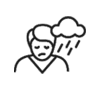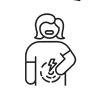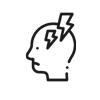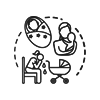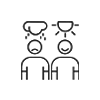
Signs and Symptoms
- Feelings of sadness & irritability most of the day, nearly every day
- Loss of interest in most activities once enjoyed
- Weight loss or gain or changes in appetite
- Trouble falling asleep, staying asleep, or wanting to sleep more than usual
- Feelings of restlessness, experiencing tremors or meaningless movements
- Feeling unusually tired or having a lack of energy
- Feeling of worthlessness or guilt
- Difficulty in concentrating, thinking, or making decisions
- Thoughts of harming oneself or committing suicide

